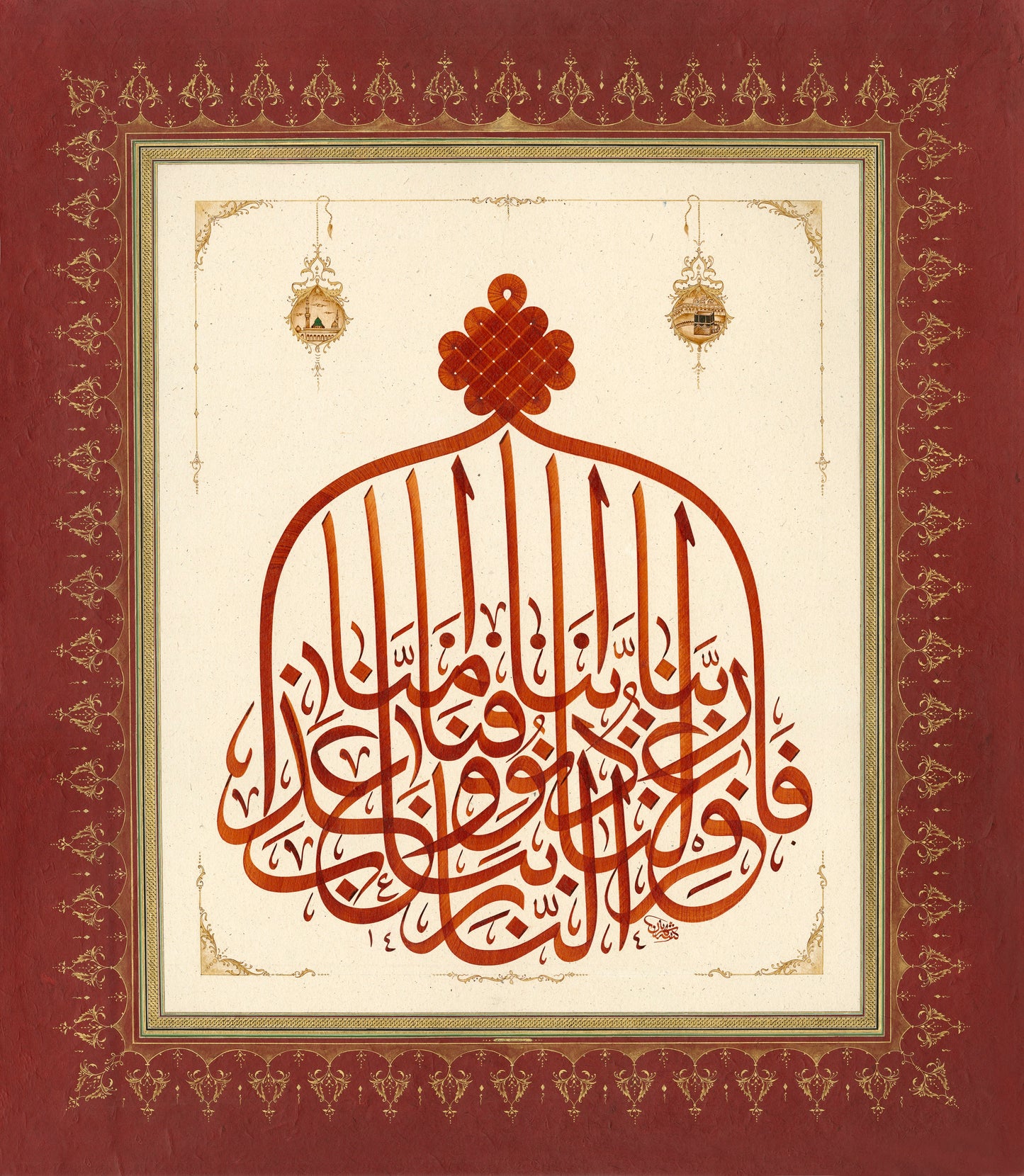
Description
This piece is a supplication from Surah Āli-ʿImrān:
رَبَّنَاۤ إِنَّنَاۤ ءَامَنَّا فَٱغۡفِرۡ لَنَا ذُنُوبَنَا وَقِنَا عَذَابَ ٱلنَّارِ“
Our Lord! We have believed, so forgive our sins and protect us from the torment of the Fire.”[Surah Āli-ʿImrān: 16]The cage-like structure of the composition is inspired by the hadith:
الدنيا سجن المؤمن وجنة الكافر . رواه مسلم
The dunya (this temporary world/life) is the prison of the believers and the paradise of the disbelievers. (Narrated by Muslim)Another source of inspiration for this composition is from the Qur’an:
وَعَدَ اللَّهُ الَّذِينَ آمَنُوا مِنْكُمْ وَعَمِلُوا الصَّالِحَاتِ لَيَسْتَخْلِفَنَّهُمْ فِي الْأَرْضِ كَمَا اسْتَخْلَفَ الَّذِينَ مِنْ قَبْلِهِمْ وَلَيُمَكِّنَنَّ لَهُمْ دِينَهُمُ الَّذِي ارْتَضَى لَهُمْ وَلَيُبَدِّلَنَّهُمْ مِنْ بَعْدِ خَوْفِهِمْ أَمْنًا يَعْبُدُونَنِي لَا يُشْرِكُونَ بِي شَيْئًا وَمَنْ كَفَرَ بَعْدَ ذَلِكَ فَأُولَئِكَ هُمُ الْفَاسِقُونَ
Allah has promised those who have believed among you and who have done righteous deeds that He ﷻ will surely grant them succession [to authority] upon the earth just as He granted it to those before them and that He will surely establish for them [therein] their religion which He has preferred for them and that He will surely substitute for them, after their fear, security, [for] they worship Me, not associating anything with Me. But whoever disbelieves after that - then those are the defiantly disobedient.[Surat Al Noor: 55]
In this ayah, we see that Allah ﷻ has guaranteed those who believe authority and preference over those who deliberately strive to spread evil. The composition reflects this promise by placing the words “we have believed” in the top line above the line about forgiveness. Humans make mistakes and require protection from Allah. This second line, which discusses sins and forgiveness, draws our eyes up and away from the final line where the word “fire” is left unaccompanied. This is an embodiment of the ayah:
إِنَّ الْمُنَافِقِينَ فِي الدَّرْكِ الأَسْفَلِ مِنَ النَّارِ وَلَنْ تَجِدَ لَهُمْ نَصِيرًا
Indeed, the hypocrites will be in the lowest depths of the Fire - and never will you find for them a helper[Surat Al Nisaa: 145]
The letters غ and ع in the words فاغر and عذاب have the same form and are perfectly balanced. This is a reminder that the غفران and the عذاب of Allah ﷻ is just and fair. The letter و between the letters غ and ع are a further reminder that Allah ﷻ is الغفار and العذاب; the One who forgives and the One who punishes, and all punishment and forgiveness lie within His power.This composition illustrates the theme of the believer that is sincere and who consistently returns to Allah to seek forgiveness and guidance, being safe from the hellfire.The letter ف on the right draws the eye upwards to the top of the composition, which weaves into a chain of ascending and descending interwoven lines. The shape of the ف represents the human curled up in the fetal position at the beginning of the journey through life. The interwoven chain symbolizes life and the constant ups and downs that each individual faces. The chain then descends into the letter ا which symbolizes the end of life with the human laying straight in the grave.
There are 5 ascending motions and 5 descending motions. The number 5 has several symbolic meanings in this composition. The number 5 represents the Salah; the 5 daily prayers. It represents the miracle of the Qur’an where the phrase: اقم الصلاة - establish the prayer, was mentioned 5 times in the Qur’an. The word صلوات (prayers, in the Arabic plural form) was also mentioned 5 times in the Qur’an. Therefore, the believer’s belief and philosophy on life points to salah (prayer) as the key to success in this world and on the day of judgement. Allah ﷻ reminds us in the Qur’an that he created humans and Jin in this world for Ibadah (worship). So although, this life of highs and lows life may seem like a prison for those who long to be with Allah ﷻ in the hereafter, it is a part of perfectly balanced design of drawing those who believe back to Him ﷻ through prayer and supplication.

